[ This blog covers IoTDay 2019 held on Saturday 13 April 2019. Contributed by and thanks to Ojasvi Gupta
See also YourStory coverage refrenced in sections of the blog]
Abstract
Over 250 registered delegates, 30 speakers and 5 emerging startups spent a wonderful time at the Bangalore International Center’s gracefully designed new facility. It had a great auditorium open and sunlit courtyards and a feel unlike that of a regular hotel or event facility.
Participants appreciated the variety and depths of topic of discourse. The LoRa business case, The scaling of Startups and the Open Lab were some of the few commented on.
Project Usiru, the largest crowd sourced air cleaning project with the GoK Bangalore Smart City was described by Sir Mahendra Jain, Additional Chief Secretary UDD, GoK
The Emerging Start-up awards session saw the 5 emerging startup Awardees, under the umbrella of TiE Bangalore’s mentorship program, discussing the pitfalls and challenges of the ecosystem in conversation with the current and past presidents of TiE Bangalore.
The Awardees were
Open House-IoT Entrepreneur Challenges
Warming up to the day’s agenda, the panel moderated by Arvind Tiwary, started with a look at achievements till date and then took to task some of the most important stakeholder-relevant questions surrounding the IoT industry.
Some of the issues raised in the panel ranged from hardware challenges like device battery performance, to the use of unlicensed sub gHz spectrums like LoRa as a response to call drop problems and connectivity issues for connected devices.
Policy level initiatives like discussions on using the legacy 2G spectrum as a dedicated channel for IoT devices also brought forth the pros and cons of these approaches.
The Open House saw questions raised on the interoperability of existing solutions with a call for the use of more innovative communication architectures while developing IoT based smart solutions.
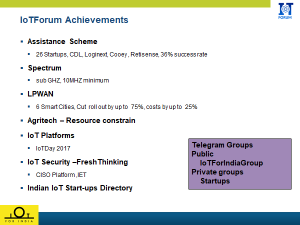
Keynote Address
The Live-Streamed keynote by Rob Van Kranenburg presented similarities between the European and Indian policy decisions and how our growing digital presence and evloution needs more direction.
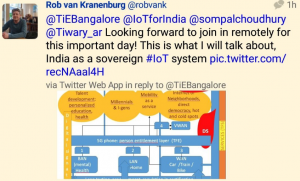 Rob highlighted the emerging geopolitical forces at work which are leading to fragmentation and more centralized control either nation states like China or large corporations like Amazon, Google and Facebook etc. Next generation internet will have more bandwidth and interactivity but it also needs more focused action by communities and countries like India to shape privacy and public policy usage of the technology.
Rob highlighted the emerging geopolitical forces at work which are leading to fragmentation and more centralized control either nation states like China or large corporations like Amazon, Google and Facebook etc. Next generation internet will have more bandwidth and interactivity but it also needs more focused action by communities and countries like India to shape privacy and public policy usage of the technology.
LoRa-The Business Case
This panel discussed upon the open-source business model of self installed or self managed neighborhood IoT network using LoRa. Some Smat cities in India have commissioned a LoRa network and installed by some of the panel members as a contractor. Some like Tata Communication and Sen Ra provide a managed service using a private LoRa network. Many communities like IISc and other have own private LoRa installations.
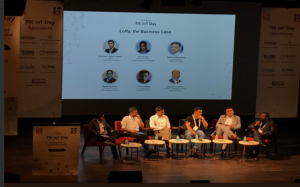 The rationale behind choosing LoRa WAN among the multiple technologies available today was explored. Reach, long battery life and lower overall cost of use were highlighted. Questions pertaining to time and cost of getting the prototype out into the market to operational efficiency due to LPWAN’s lack of maturity in developer community were explored. The Things Network (TTN) in Australia with MeshIoT provides public freemium model . Many devices use LoRA from TTN for free. .
The rationale behind choosing LoRa WAN among the multiple technologies available today was explored. Reach, long battery life and lower overall cost of use were highlighted. Questions pertaining to time and cost of getting the prototype out into the market to operational efficiency due to LPWAN’s lack of maturity in developer community were explored. The Things Network (TTN) in Australia with MeshIoT provides public freemium model . Many devices use LoRA from TTN for free. .
The team also discussed actuals like non-recurring setup costs and number of user devices falling under one gateway, which depends on the frequency of data upload. Comparisons to other modes of communication like bluetooth, zigbee provided a broader perspective on different use cases for the listeners.
The scalability element for LoRaWAN, as both a public and private network, proved to be a crowd favorite in the course of the discussion. LoRa gateways are designed for more denser device landscape then 3G and 4G and can support 10X to 50X more devices per MhZ band.
Open Lab
A lightning talk by Sanjeev Keskar of Arrow India, on their forthcoming collaboration with STPI for the sequel to their successfully run Hong Kong based Open Lab now replicated as IoT Open Lab in Namma Bengaluru, the Silicon Valley of India, provided industry insight into the end-to-end solutions based hardware Incubation Centre (CoE), that currently boasts of a million Dollars in investment.
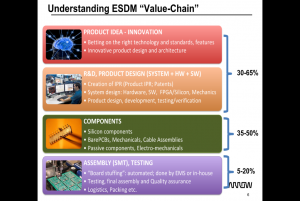 IoT Open Lab Bengaluru is designed with a goal of mentoring about a 100 startups in the next 5 years, which is why the founding partners STPI, MeitY and Arrow India have focused on curating hard-to-access facilities like Sample Bank, Hardware Design and Testing equipment, Hardware-focused business advisory boards, and thus holistically impacting both the engineering as well as financial, business-ended challenges that IoT start-ups today are facing.
IoT Open Lab Bengaluru is designed with a goal of mentoring about a 100 startups in the next 5 years, which is why the founding partners STPI, MeitY and Arrow India have focused on curating hard-to-access facilities like Sample Bank, Hardware Design and Testing equipment, Hardware-focused business advisory boards, and thus holistically impacting both the engineering as well as financial, business-ended challenges that IoT start-ups today are facing.
The CoE’s focus on taking an Idea to PoC, while helping students and incubatees prioritize on features to meet MVP price points by the in-house expertise, is unmatched as a service in the Indian market.
Interested startups and entrepreneurs can just walk in the eCITY facility for Open Lab, provided by STPI and find the help they need or they can find out more here. The state-of-the-art facilities are available at a subsidized rate of Rs.10,000 as initial membership fee and a 3% equity given to STPI.
Scaling of Startup's - A startup leader's insight
This was a standout session with great points and discussion between the panel and the moderator. Sanjay dug deeper to get the founders narrow down to the ore reason of choosing the product or problem to solve.
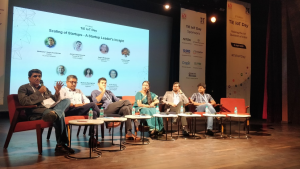 It was personal experience with some like Geetha (Nirmai) and Vivkek (SmarterHomes ) or more a top down business segment (Tonbo) . The role of product engineering and capability to choose partners or source from within or outside India was explored. The strong link to a passion to solve a large problem came thru. Also an amusing anecdote by Krishna (Cropin) on hiring talent when the startup does not have money. Geetha spoke about the need to get funds within a few months was so urgent at starting up that her team joined and worked pro bono really for a few months. Vivek (SmarterHomes) dwelt on the final price point of the water meter driving his entire plan. 80% of features with 20% of price of available meters drove a lot of work. Even though water meters once installed were “invisible” he wanted a good looking one and though not an engineer designed the package!!
It was personal experience with some like Geetha (Nirmai) and Vivkek (SmarterHomes ) or more a top down business segment (Tonbo) . The role of product engineering and capability to choose partners or source from within or outside India was explored. The strong link to a passion to solve a large problem came thru. Also an amusing anecdote by Krishna (Cropin) on hiring talent when the startup does not have money. Geetha spoke about the need to get funds within a few months was so urgent at starting up that her team joined and worked pro bono really for a few months. Vivek (SmarterHomes) dwelt on the final price point of the water meter driving his entire plan. 80% of features with 20% of price of available meters drove a lot of work. Even though water meters once installed were “invisible” he wanted a good looking one and though not an engineer designed the package!!
Arvind (Tonbo) was keen to see if his fellow panelist Geetha (Nirmai) would start using thermal cameras from Tonbo.. The conversations flowed for 75 minutes and were engaging….
As noted by the panelist do attend events. You meet and get invested…
See also: Prototype, product, profit: how these startups scaled up for market success
Project Usiru
IoTForum has proposed the largest crowd sourced project to clean the air in Bengaluru, under the Bangalore Smart City project. During the panel discussion, Shri Mahendra Jain the Additional Chief Secretary, UDD, GoK looked forward to the transformative potential of crowd-sourcing and citizen-oriented projects and was open to explore impactful and innovative projects.
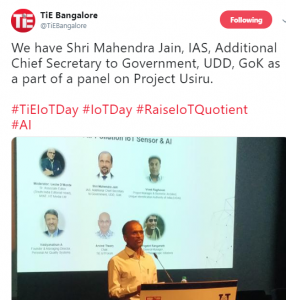 The experimental project, employing various approaches after discussions with stakeholders like Clear Air Platform, KUIDFC, Smart City Namma Bengaluru, Centre for Environmental Science & Engineering, IITK, intends to use hourly contribution from thousands of residents, hundreds of Corporates, dozens of NGO and open data community with advanced AI/ML and IoT Data Sensor cloud.
The experimental project, employing various approaches after discussions with stakeholders like Clear Air Platform, KUIDFC, Smart City Namma Bengaluru, Centre for Environmental Science & Engineering, IITK, intends to use hourly contribution from thousands of residents, hundreds of Corporates, dozens of NGO and open data community with advanced AI/ML and IoT Data Sensor cloud.
Volunteers can contribute and be a part of this initiative by filling out the form provided at the beta Usiru website. https://bit.ly/UsiruBLR .The long blog at http://www.iotforindia.org/usiru covers the project in depth
Transforming Lives through Intelligent IoT Applications
The session started by a recounting of how we’ve always looked at the ideal smart home world by Manish, our moderator. Taking the cue from there, his questions circled at where we, as a world, are today in that connected journey. As smart campuses in the Netherlands and Israel due to be launched in the next couple of years came up, that brought the panel to discuss on the importance of user stories focused design experiences that few architectural firms are experimenting with, today.
The panel also discussed the lack of hardware understanding with which many innovators start out in their entrepreneurial journey and then after certain number of product iterations find out that they have to re-do the whole board design, which defines the difference between prototyping with off-the-shelf modules and designing manufacture ready products.
Narrowing down further, the questions posed now were India-centric, with passive as well as mass consumption of technology being considered, our gesture and visual based preference to generic text content also provided an insight to the needs of Urbane India and Rural Bharat.
The unorganised agricultural sector’s need for reform by way of information, portal updation and a synergistic public private partnership stressed on our need for understanding the problem universe in entirety instead of just infrastructural investments by governing bodies.
A speaker pointed out our journey from being an agrarian country to a technologically developed one, skipping the learning curve that developed countries had to cope up with these changes.
Startup Pitches - Top 5 Upcoming IoT Startups Speakers
Som the IoTForum lead member introduced the concept of The Emerging Start-up awards. True innovation is dififcult and startups need to get talent, customers and funding. At IoTNext ( Co hosted by TiE IoTForum and IESA ) thes awards have been helpful into getting visibility to promising innovative start-up who may lack maturity . The session saw the 5 emerging startup Awardees, under the umbrella of TiE Bangalore’s mentorship program, discussing the pitfalls and challenges of the ecosystem in conversation with the current and past presidents of TiE Bangalore .
The Awardees were
ThingsCloud , Noos Technoloies, TrillBits , Vyuti ,NumoCity
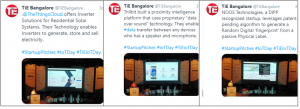
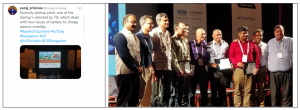
See also IoT Day 2019: meet the top 5 emerging IoT startups of India
Fundraising Workshop with M.J. Aravind
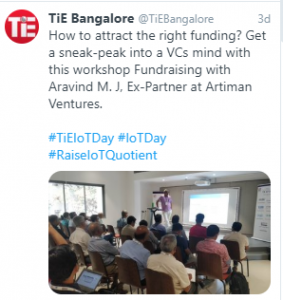 This was a packed house and very engaged.
This was a packed house and very engaged.
Right from getting a VC investor to buy into your problem, the workshop delved into the inner workings of successfully solving a problem a la startup.
Having the singular experience of being on both sides of the table, both as a startup founder and a VC guy, M.J. Aravind expertly took the audience on a tour of point and marker driven decisions by a regular startup investor, that often seem like gut instinct to most of us.
He repeatedly stressed on multi-factored approaches by successfully funded startups dealt with not just empirical data shown on slides, due diligence of their own limitations and peers but also differentiation in the product offerings, either by way of process or IP, due to a company’s approach and their tendency to iterate based on real customer pain points and feedback.
A lot of the lessons were centred around a humorous theme of dating a VC investor, and yet it smoothly dealt with their preference towards simple solutions as opposed to ones where one has to marry in multiple sectors, for example by way of infrastructure, device design etc.
The questions thrown at the speaker by the audience were therefore a knowledgeable set, that brought about discussions like a VC firm’s charter vs your product, what should founders look for in a VC Firm, along with a witty answer to the old question ‘can anyone else do this?’ often thrown at founders, to which M.J. cooly replied, ‘Anybody can do it, except that I already thought of it and am doing it.’
The slides are available at https://bit.ly/IoTDay2019
Workshop on LoRaWAN Technology Implementation and Challenges
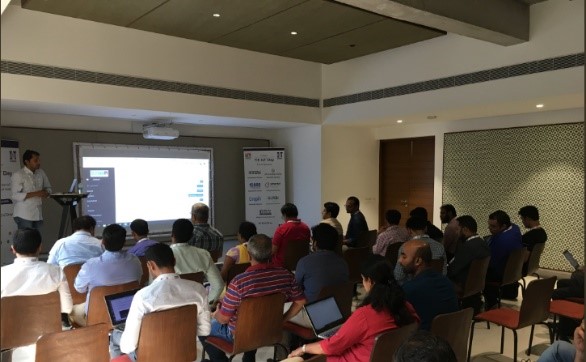 What with all the conversation revolving around LPWAN, a specially curated workshop on the popular issues that developers face was conducted by ClodPi. A full-house of about 30 enthusiasts sat down with their computer systems and a LoRa WiFi module and got to coding.
What with all the conversation revolving around LPWAN, a specially curated workshop on the popular issues that developers face was conducted by ClodPi. A full-house of about 30 enthusiasts sat down with their computer systems and a LoRa WiFi module and got to coding.
From step-by-step guidance to setting up their own LoRa network, the participants also discussed the many strategies that could be employed smartly to economically use their network for the most amount of devices.

[…] the European Research Cluster and a member of the SmartCitiesWorld Advisory Board. Speaker at IoTDay 2019 […]